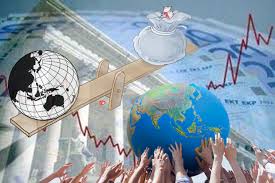The global economy refers to the interconnected economic activities of countries around the world. It encompasses trade, investment, and financial systems that span international borders. Understanding its dynamics is crucial for grasping how local economies are influenced by global trends.
Key Drivers of the Global Economy
- International Trade: Global trade involves the exchange of goods and services across borders. Major trading nations, such as the United States, China, and the European Union, play a significant role in shaping global economic trends. Trade agreements and tariffs can impact economic growth and stability.
- Global Financial Markets: Financial markets, including stock exchanges and investment platforms, operate on a global scale. Market fluctuations in one region can affect economies worldwide. For example, changes in U.S. interest rates can influence global investment flows.
- Technological Advancements: Innovations in technology drive economic growth by creating new industries and improving productivity. Technologies such as artificial intelligence and renewable energy are reshaping global markets and creating new economic opportunities.
- Geopolitical Events: Political stability, conflicts, and diplomatic relations affect global economic stability. Geopolitical tensions can disrupt trade and investment, influencing global economic performance.
- Economic Policies: Central banks and governments implement policies that impact global economic conditions. Interest rates, fiscal policies, and regulatory changes can influence international trade and investment patterns.
Current Trends
- Economic Recovery Post-Pandemic: Many economies are recovering from the impacts of the COVID-19 pandemic. While some regions are experiencing robust growth, others are facing challenges such as supply chain disruptions and inflation.
- Sustainability Focus: There is a growing emphasis on sustainable development. Investments in green technologies and initiatives to combat climate change are becoming central to global economic strategies.
- Digital Transformation: The rise of digital currencies, e-commerce, and remote work is transforming how businesses operate and how economies function. This digital shift is reshaping global economic interactions and creating new growth areas.
Conclusion
The global economy is a complex and dynamic system influenced by various factors, including trade, finance, technology, geopolitics, and policy. Understanding these elements helps us navigate the interconnected world of international economics and anticipate future trends.
